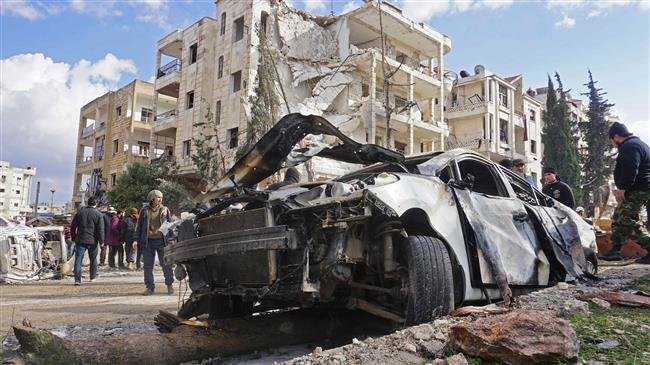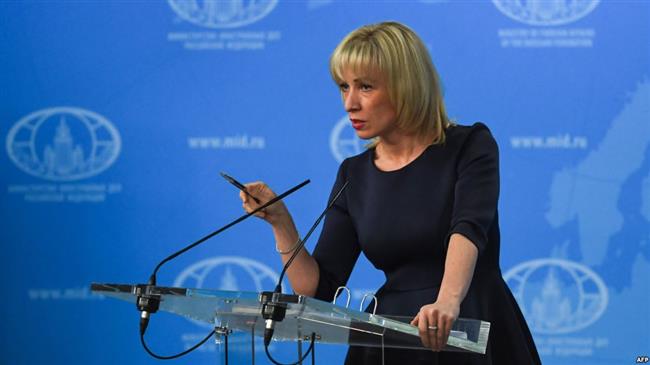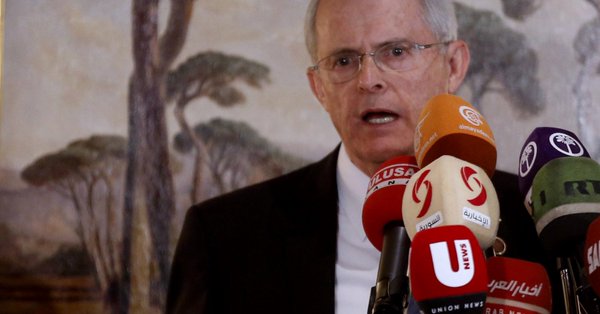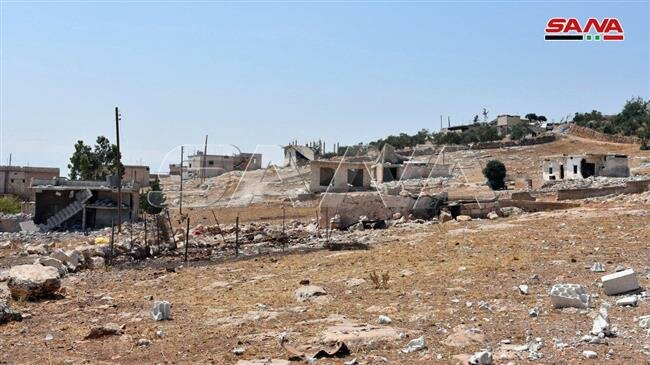More than a dozen people have lost their lives and dozens of others sustained injured when a powerful explosion ripped through the center of a city controlled by foreign-sponsored Takfiri militants in Syria’s northwestern city of Idlib.
Publish dateWednesday 24 April 2019 - 23:30
Story Code : 183962
AVA- The so-called White Helmets civil defense group and residents said the blast took place in Jisr al-Shughour, located about 330 kilometers (200 miles) north of the capital, Damascus, on Wednesday as several residential buildings collapsed as a result of the act of terror.
Ahmad Yaziji, a member of Western-backed White Helmets, who have been accused of cooperating with Takfiri militants and staging false flag gas attacks, said at least 17 people were killed and at least 27 people, mostly civilians, were injured. He noted that the number of casualties is expected to rise as some of the injured are in a critical condition, and rescue workers are recovering bodies from under the rubble.
The so-called Syrian Observatory for Human Rights said the cause of the blast in Jisr al-Shughour was not immediately clear.
“It is not known until now whether it was a car bomb, or the explosion of a car carrying explosives,” head of the Britain-based monitor group Rami Abdel Rahman noted.
Under a deal reached following a meeting between Turkish President Recep Tayyip Erdogan and his Russian counterpart Vladimir Putin in the Black Sea resort city of Sochi on September 17, 2018, all militants in a demilitarized zone, which surrounds Idlib and also parts of the adjacent provinces of Aleppo and Hama, were supposed to pull out heavy arms by October 17 that year, and Takfiri groups had to withdraw by October 15.
The National Front for the Liberation of Syria is the main Turkish-backed militant alliance in the Idlib region, but the Takfiri Hayat Tahrir al-Sham (HTS) terrorist group, which is a coalition of different factions of terror outfits, largely composed of the Jabhat Fateh al-Sham Takfiri terrorist group, holds a large part of the province and the zone.
The HTS, which is said to be in control of some 60 percent of Idlib province, has yet to announce its stance on the buffer zone deal.
It is estimated that between 10,000 and 15,000 members of different factions of armed groups, which Syria, Russia and Turkey consider terrorists, are active in the volatile province, which is home to around three million inhabitants.
Russia believes that a buffer zone would help stop attacks from Idlib-based militants on Syrian army positions and Russia's military bases in the flashpoint region.
Ahmad Yaziji, a member of Western-backed White Helmets, who have been accused of cooperating with Takfiri militants and staging false flag gas attacks, said at least 17 people were killed and at least 27 people, mostly civilians, were injured. He noted that the number of casualties is expected to rise as some of the injured are in a critical condition, and rescue workers are recovering bodies from under the rubble.
The so-called Syrian Observatory for Human Rights said the cause of the blast in Jisr al-Shughour was not immediately clear.
“It is not known until now whether it was a car bomb, or the explosion of a car carrying explosives,” head of the Britain-based monitor group Rami Abdel Rahman noted.
Under a deal reached following a meeting between Turkish President Recep Tayyip Erdogan and his Russian counterpart Vladimir Putin in the Black Sea resort city of Sochi on September 17, 2018, all militants in a demilitarized zone, which surrounds Idlib and also parts of the adjacent provinces of Aleppo and Hama, were supposed to pull out heavy arms by October 17 that year, and Takfiri groups had to withdraw by October 15.
The National Front for the Liberation of Syria is the main Turkish-backed militant alliance in the Idlib region, but the Takfiri Hayat Tahrir al-Sham (HTS) terrorist group, which is a coalition of different factions of terror outfits, largely composed of the Jabhat Fateh al-Sham Takfiri terrorist group, holds a large part of the province and the zone.
The HTS, which is said to be in control of some 60 percent of Idlib province, has yet to announce its stance on the buffer zone deal.
It is estimated that between 10,000 and 15,000 members of different factions of armed groups, which Syria, Russia and Turkey consider terrorists, are active in the volatile province, which is home to around three million inhabitants.
Russia believes that a buffer zone would help stop attacks from Idlib-based militants on Syrian army positions and Russia's military bases in the flashpoint region.
avapress.net/vdciqpazrt1av32.ilct.html
Tags
Top hits












